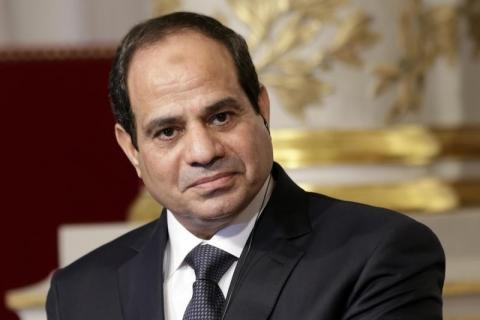Advertisement
Egypt's Sisi cuts short Ethiopia visit after 30 killed in Sinai
CAIRO/ISMAILIA (Reuters) - Egyptian President Abdel Fattah al-Sisi cut short a visit to Ethiopia for an African Union summit on Friday, after Islamic State's Egyptian wing claimed the killing of at least 30 security personnel in the Sinai Peninsula.
Sisi's office said in a statement that Sisi would return to Cairo after Friday morning's opening session.
The four separate attacks on security forces in North Sinai on Thursday night were among the bloodiest in years. Most of the casualties occurred in the bombing of a military hotel and base in the heavily guarded provincial capital, al-Arish.
Security sources in Sinai said three military planes left al-Arish for Cairo on Friday morning carrying 30 body bags, some of them containing corpses in pieces from the bomb attacks. They said at least five men were in critical condition and the death toll was likely to rise.
Two children, one of them 6 months old, died on Friday from wounds suffered on Thursday night as soldiers fought militants in a village near Sheikh Zuweid, close to the Gaza Strip and Israel's border, local medical sources said.
An Islamist insurgency based in the Sinai has intensified since the army ousted president Mohamed Mursi of the Muslim Brotherhood in July 2013 after mass protests. Hundreds of members of the security forces have been killed.
The Brotherhood denies links to the insurgents but the government makes no distinction between them.
The most active group, Ansar Bayt al-Maqdis, changed its name to Sinai Province last year when it swore allegiance to Islamic State, the hardline Sunni militant group that has seized swathes of Iraq and Syria, drawing U.S.-led air strikes.
A daily news broadcast released via Islamic State Twitter feeds said Thursday's attacks had been led by "men of the Islamic State".
Soldiers and police are often targeted at outposts outside Sinai's main towns, but the attack on military facilities in al-Arish could signal an escalation in their capabilities, said Zack Gold of the Institute for National Security Studies in Tel Aviv.
The week had already been a bloody one in Egypt. More than 25 people were killed at the weekend when security forces fired at protesters angered by what many perceive as a police state.
After two attacks in October in which 33 security personnel were killed, Egypt declared a state of emergency in the area where Sinai borders Gaza and accelerated plans to create a buffer strip.
Sisi, who as army chief toppled Mursi, says Egypt is fighting a war on terrorism and has the support of Western and Gulf Arab allies.



















Add new comment